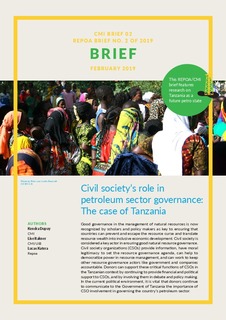| dc.contributor.author | Dupuy, Kendra | |
| dc.contributor.author | Rakner, Lise | |
| dc.contributor.author | Katera, Lucas | |
| dc.date.accessioned | 2019-05-10T14:00:09Z | |
| dc.date.available | 2019-05-10T14:00:09Z | |
| dc.date.issued | 2019-05-01 | |
| dc.identifier | oai:www.cmi.no:6850 | |
| dc.identifier.citation | Bergen: Chr. Michelsen Institute (CMI Brief no. 2019:02) 4 p. | |
| dc.identifier.issn | 0809-6732 | |
| dc.identifier.uri | http://hdl.handle.net/11250/2597288 | |
| dc.description.abstract | Good governance in the management of natural resources is now recognized by scholars and policy makers as key to ensuring that countries can prevent and escape the resource curse and translate resource wealth into inclusive economic development. Civil society is considered a key actor in ensuring good natural resource governance. Civil society organizations (CSOs) provide information, have moral legitimacy to set the resource governance agenda, can help to democratize power in resource management, and can work to keep other resource governance actors like government and companies accountable. Donors can support these critical functions of CSOs in the Tanzanian context by continuing to provide financial and political support to CSOs, and by involving them in debate and policy making. In the current political environment, it is vital that donors continue to communicate to the Government of Tanzania the importance of CSO involvement in governing the country’s petroleum sector. | |
| dc.language.iso | eng | |
| dc.publisher | Chr. Michelsen Institute | |
| dc.relation | CMI Brief | |
| dc.relation | 2019:02 | |
| dc.relation.ispartof | CMI Brief | |
| dc.relation.ispartofseries | CMI Brief no. 2019:02 | |
| dc.relation.uri | https://www.cmi.no/publications/6850-civil-societys-role-in-petroleum-sector-governance-the-case-of-tanzania | |
| dc.subject | Tanzania | |
| dc.title | Civil society’s role in petroleum sector governance: The case of Tanzania | |
| dc.type | Report | |
